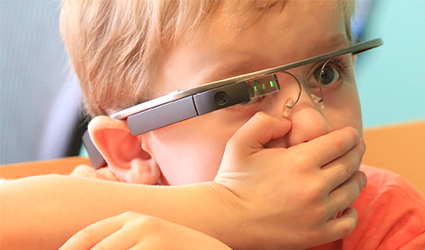Google Glass Eye-Wearable to Enhance Social Skills among Autism Kids
August 6, 2018
Source: MedPageToday
 1,528
1,528

A research team from Stanford University School of Medicine created a smartphone app paired with Google Glass eye-wearable to help children with autism interpret emotions via facial expressions and develop communication skills.
Dennis Wall, PhD from Stanford University and one of the co-author of this study said, "This is a viable strategy to deliver social training; It encourages facial contact and social interaction, but it also provides an appreciation of the salience of emotion, that there is something interesting inherently about human faces. It's exciting, fun, and functional; In fact, the children in the study called it their superpower, so we decided to call it Superpower Glass."
The Google Glass device is linked to a speaker, small screen and a smartphone, which consists of an eyeglasses-like frame with a camera to record the field of view of the wearer. When a child with autism interacts with others, the app immediately identifies their emotions through Google Glass screen or speaker. Using applied behaviour analysis, clinicians are able to teach emotional recognition using flash cards which depict faces with different emotions.
The research was supported by the Hartwell Foundation, the National Institutes of Health, the Bill and Melinda Gates Foundation, the Lucile Packard Foundation, and the Coulter Foundation, as well as grants from Stanford's Precision Health and Integrated Diagnostics Center, Bio-X Center, Beckman Center, the Child Health Research Institute, the Predictive and Diagnostics Accelerator Program, and Human-Centered AI.
By Ddu
Read more on
- Things to Know before Buying Newborn Baby Incubators March 31, 2022
- Highly Resistant Food Poisoning Bug Responds to Antibiotics September 6, 2018
- Smartphone Based Diagnosis to Identify Mosquitoes Transmitting Infection September 5, 2018
- 3 Natural Plant Extracts Manufacturers on Drugdu.com September 4, 2018
- Shenzhen Chuanggan – Health Assessment Facility Supplier September 4, 2018
your submission has already been received.
OK
Subscribe
Please enter a valid Email address!
Submit
The most relevant industry news & insight will be sent to you every two weeks.



